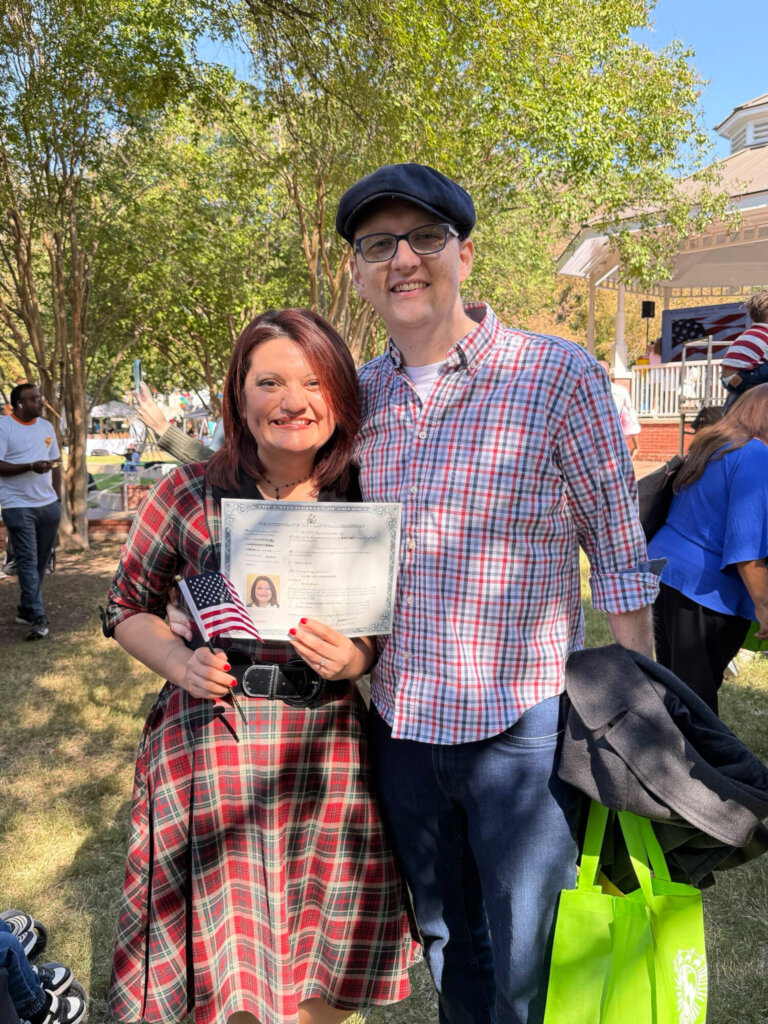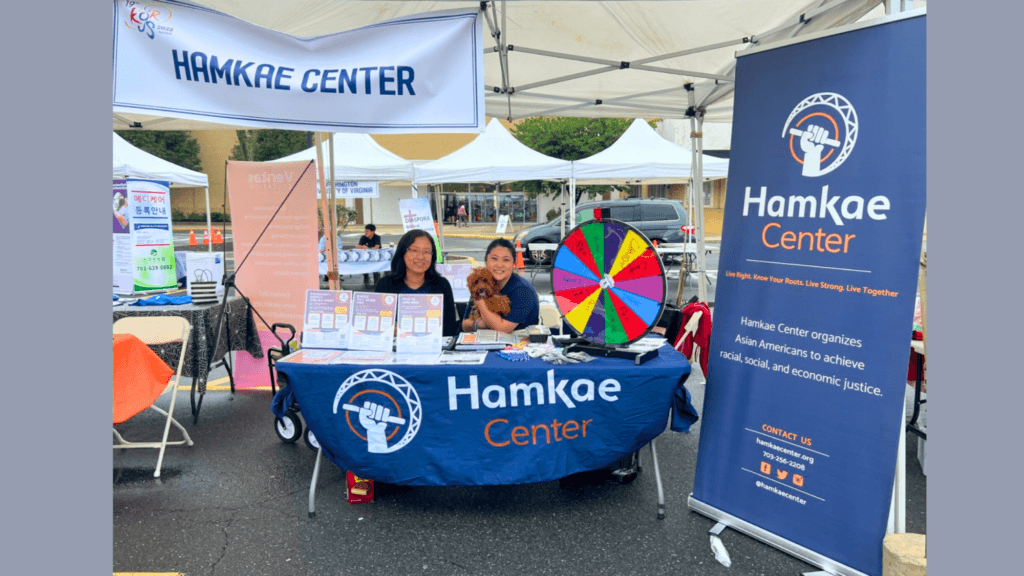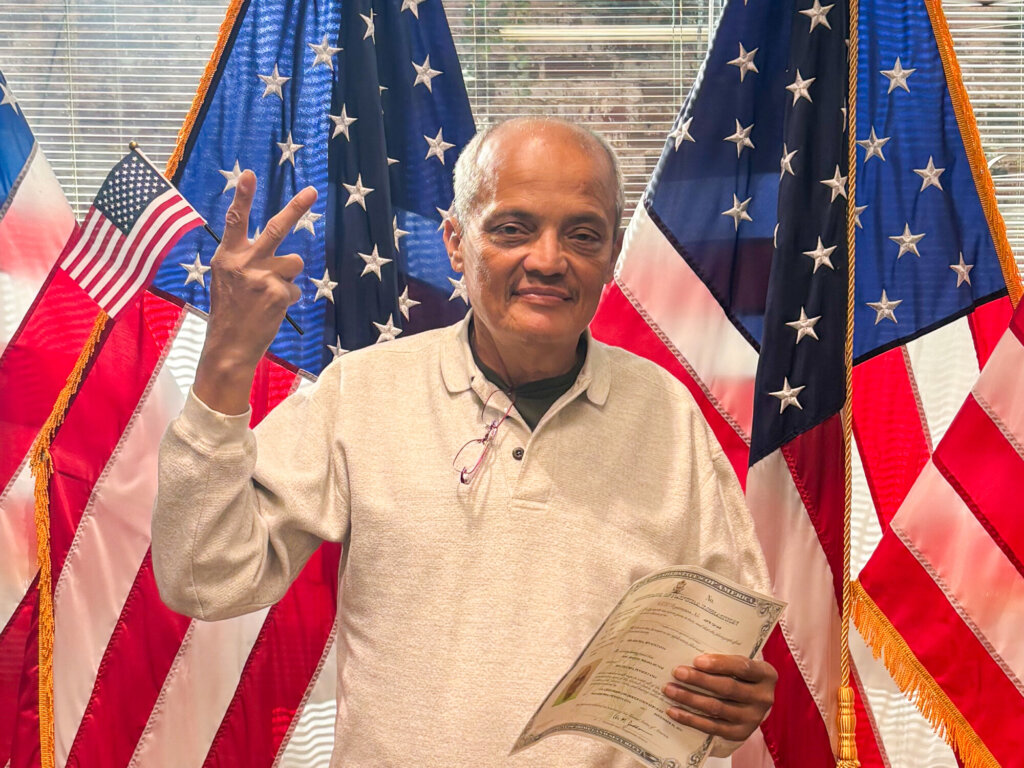Karen Jimenez: “I’m so excited to vote! Honestly, it’s a privilege to be able to vote.”
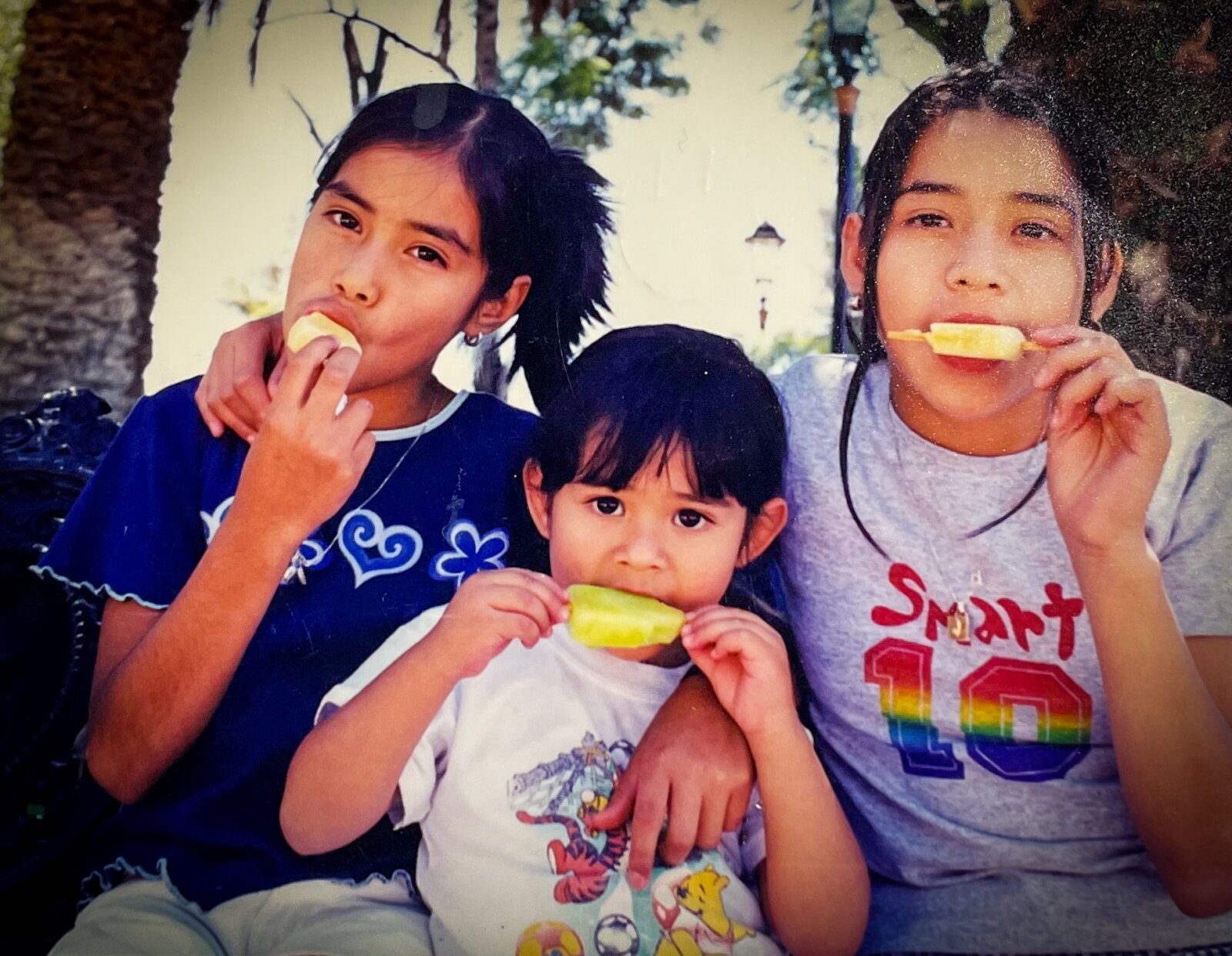 Karen with her two younger sisters in Mexico. (Photo courtesy of Karen Jimenez)
Karen with her two younger sisters in Mexico. (Photo courtesy of Karen Jimenez)Explore More
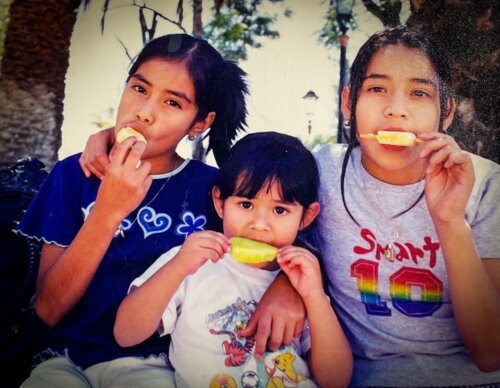
I was 12 when I came to the United States by myself. My name is Karen Jimenez and I was born in San Luis Potosi, Mexico. I lived with my parents until I was nine. It was an abusive house, physically and verbally, so at 9 years old I decided to get out and to go live with my grandma. It was very hard for my grandma to take care of me and keep up with her own life. She talked with a family member in the U.S. and described the situation. My grandmother asked her if there was space for me and if it was possible to take care of me.
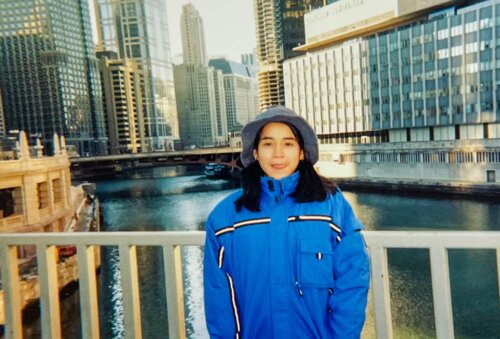
When I finally arrived in the States, I had not seen my relative in a really long time, but I was excited to come here to live. Everything was so new to me, it was scary. I didn’t know anyone. I didn’t speak the language. I had to get used to just going along with whatever came to me. I enrolled in middle school and for all of 8th grade, in an ESL class, my teacher only spoke Spanish. I didn’t learn much English until I got into high school, where it was necessary for me to speak English.
When I learned about DACA, I had just graduated high school. I heard about the DREAM Act (Development, Relief, and Education for Alien Minors) at school, and from my then boyfriend, now husband. He took me to HACES (Hispanic American Community Education and Service), because they helped his family to apply for their residency when his stepdad brought them from Mexico. They later helped him to apply for his citizenship, and all his family applied there. He told me, “This is a safe place. They helped me and my family out.”
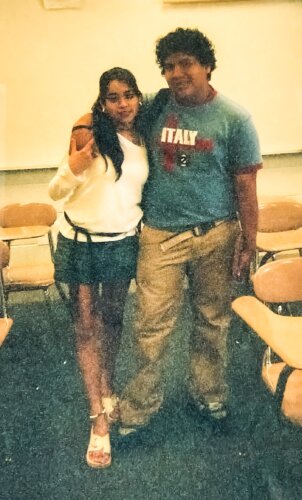
Any immigration process can be hard. I was scared that if I said something wrong, they would send me back to Mexico. But they just told me to bring documentation and explained the process. They said that they were going to be able to work with me. I was actually one of the first ones to apply for DACA with HACES. Lupita helped me. She is amazing. I love her! She helped me with the whole process and the paperwork. I went to Navy Pier in Chicago where they were taking applications. Lupita told me what to expect and calmed my nerves. She said, “Don’t worry. Everything’s going to be okay. You’ll make it! Just don’t be nervous. You can call me at any time.” I was there waiting in that line for three or four hours. I got there early in the morning and the line never stopped growing. It was awesome because I met so many people who were in the same situation that I was, and it was somewhat comforting to see so many people and to know that I was not alone in my situation.
After the interview they told me I was approved for DACA. I was head-over-heels excited. It wasn’t a complete step, but it was something, it made me feel so much better—safer. It allowed me to work in this country. I was less scared of everything. I went to a community college for a year. But I was paying for it myself and it was economically difficult, so I started working full time. I worked in restaurants. I worked in a gym. I worked as a babysitter. I wanted to do something with communications, so I interned for an online radio station. I tried to take any opportunity that came my way.
In 2015 I married my husband, and I was able to apply for my green card. I applied for my citizenship last year. I went back to HACES for help with each of these processes. I’m very thankful they have always been there for me, since I was a teenager until now as an adult (I’m thirty). Lupita still recognizes me. Every time she sees me, she says hello, “I remember you! You were one of our first DACA cases.” And I say, “Yes, I was one of the first DACA kids. And look at me now, I’m going to become a citizen!”
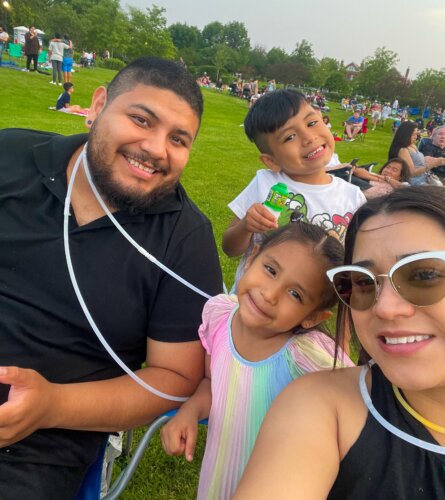
When I prepared for my citizenship interview, I was so nervous. You see the whole questionnaire and all the questions. In high school we studied the Constitution, so It was just a refresher for me. But for somebody who is new to the history of the United States, or a new English speaker, you need to learn so many things and so many words, and you have to practice again and again. I think the test can be hard, but for me, I was nervous more than anything. The woman who interviewed me was so nice. She tried to make me laugh to calm me down. She asked, “How are you?” And I said, “I’m good. But I’m pretty nervous.” And she told me, “I have that same impact on a lot of people.” I didn’t even notice when she started the questionnaire for the civics exam. Later she said, “You passed.” I thought, “Oh my God!” I wanted to cry and scream. I just tried to hold it in. My eyes watered. I couldn’t stop telling her, “Thank you. Thank you so much.” She smiled back and said, “I thought you were going to do great.”
I called Miss Martha at HACES to tell her I passed, “I did it!” She said, “I’m so happy for you. Congratulations!” At the end, you know these people for a long time, and they become family. She was more than a lawyer. She really cares. Unfortunately, because of COVID my husband was not able to go into the interview. I had to go alone. When the interview was over, I didn’t tell him that I was done, I just came straight home. I walked in the door, and he asked, “What happened? What happened?” When I told him, we both cried. He was bawling. He said, “Yes! They’re not going to take you away from me. You have always been my partner and you’re going to stay with me. We’re going to be together until we’re old!”
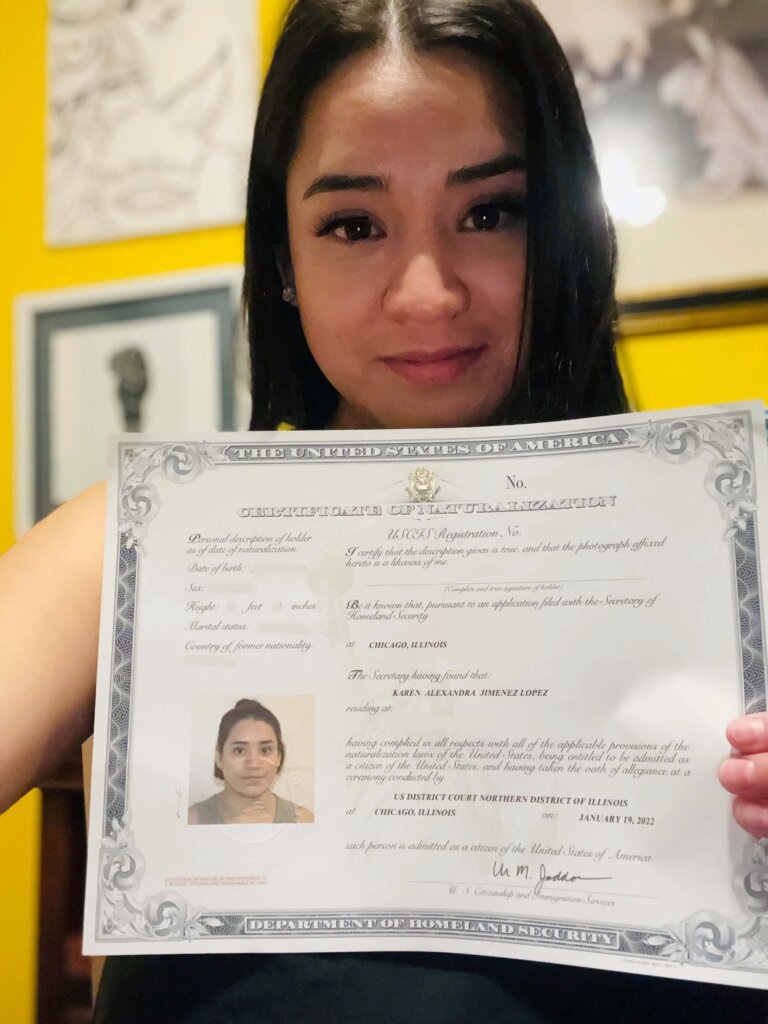
(Photo courtesy of Karen Jimenez)
I always told my husband, “You’re never going to understand, it’s so scary to drive and feel that you can be stopped at any time, and they can send you back to Mexico.” I used to live in fear. Now I have the freedom to not be scared of anything. I have the opportunity to get a better job. I never finished college, but now I might have the opportunity to finish and finally get a career and do something big. For me, U.S. citizenship was everything I had dreamed about. I come from having nothing— and I do mean nothing. Sometimes my mother was not able to give us anything to eat, and I had to go to my grandma to ask for food. I could have ended up in a really bad place and in worse situations. Instead, I ended up here with the opportunity to succeed in a country where I can do more. I didn’t want to repeat my mom’s story.
I took the citizenship oath in Chicago on January 19th. It was a small group; 15 to 20 people. Families were not allowed in unfortunately, due to new COVID-19 restrictions. The judge told us that she had immigrant parents and grandparents, so she understood what we went through. She said, “Usually I would take pictures with you, and I would hug you. I would talk to you personally. But we can’t right now, unfortunately. So, I’m just going to do this fast.” Still, it was so emotional. I was trying not to cry. But my eyes were super teary. I was thinking, “Oh my God, this is it!”
When they gave me a form to fill out, I said, “What is this?” I read it, and it was the form to register to vote. I’m so excited to vote! Honestly, it’s a privilege to be able to vote. I was really excited to see that form and put my name on it. And finally putting on the form—U.S. citizen! It feels so good. You feel relieved. You feel like, ahhh, you can breathe!
My husband waited for me outside with my two kids. My son is 6 and my daughter is 3. When I got in the car, my son said, “Mommy, welcome to the United States. Congratulations, you’re an American citizen now!” My three-year-old still doesn’t understand, but my son does. He really wants to travel to Mexico. He has friends who travel, and he says, “I want to do that.” I had to explain to him, “Mommy cannot do it because I’m waiting for this paper stuff.” Finally, I could tell him, “Baby, now Mommy can go anywhere!” And he said, “Yes, we can travel. We can see new things!” I want to see my country and visit my family, or the little family that I still have there. I have two nephews I’ve never met. More than anything, I want my kids to meet my sisters and their families.

